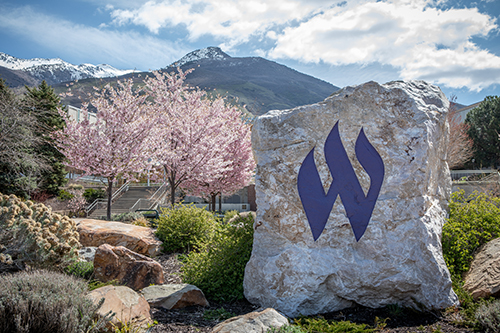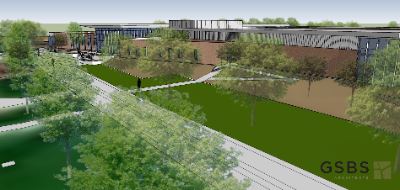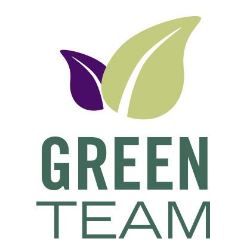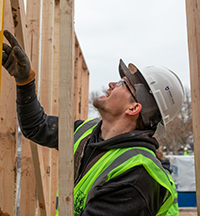WSU Celebrates 50 Years of Earth Day and Sustainability Efforts
OGDEN, Utah – Even during a global pandemic, the importance of sustainability is still a priority at Weber State University. April 22 marks the 50th anniversary of Earth Day, and WSU is celebrating its continued sustainability efforts as well as learning important  lessons from this unprecedented time.
lessons from this unprecedented time.
Sustainability Practices and Research Center Director Alice Mulder said the actions of governments and communities around the world to keep people safe in response to Covid-19 have provided a number of valuable lessons for addressing climate change.
“We have learned several things,” she said. “We can make changes quickly when we put our minds to it; behavioral changes can create a significant reduction to greenhouse gas emissions and other pollutants; and we are extremely susceptible to the forces of nature.”
New and Ongoing Sustainability Efforts:
Carbon Neutral Goal
In 2007, Weber State set the goal of becoming carbon neutral by 2050. Since then, the university has reduced its electricity consumption by 32%, natural gas consumption by 30% and total greenhouse gas emissions by 22%. In the process, WSU has saved  more than $13.6 million in energy costs in the last 10 years. This has all been accomplished while adding 536,115 square feet in new and renovated buildings to the WSU campus. The university is set to reach carbon neutrality 10 years ahead of the original goal.
more than $13.6 million in energy costs in the last 10 years. This has all been accomplished while adding 536,115 square feet in new and renovated buildings to the WSU campus. The university is set to reach carbon neutrality 10 years ahead of the original goal.
New Sustainable Computer and Automotive Engineering Building
Construction is wrapping up on the new Computer & Automotive Engineering Building at WSU Davis (2750 University Park Blvd., Layton). The all-electric building will house a state-of-the-art electric vehicle (EV) program and will be home to one level-3 charging station and four level-2 stations. By using electricity from the 7-acre solar field on the Davis campus, the building will be almost completely net zero.
W10 Parking Goes Solar
On April 27, Weber State will break ground on its first solar covered-parking array over the W10 lot on the northwest corner of the Ogden campus. The array will house 550 kilowatts of solar panels that will feed into Lindquist Hall and the campus electrical grid. The power produced by the array is expected to offset 80% of Lindquist Hall’s energy consumption.
 Sustainability Summit Held Virtually
Sustainability Summit Held Virtually
In March, WSU’s Intermountain Sustainability Summit was held virtually in response to the COVID-19 pandemic. The summit welcomed people from Utah and around the world for three webinars. Sessions were hosted by national and international sustainability experts including Hunter Lovins, president and founder of Natural Capitalism Solutions; John Cook, author of “Cranky Uncle vs. Climate Change”; Mikhail Davis, director of technical sustainability for Interface carpet; and Rob Davies, a renowned Utah climate communicator. More than 200 people listened to the presentations.
Solve Climate by 2030
As part of a national event called Solve Climate, Weber State hosted the Utah Solve Climate by 2030 webinar on April 7. The live event included 170 attendees who tuned in to hear from the four panelists, including WSU President Brad Mortensen. In total over 350 people, including teachers and students from Utah schools, registered to watch either the live webinar or the recording.
Crystal Crest Presidential Award
%20(1).jpg) President Mortensen selected WSU’s Energy & Sustainability Office and the Sustainability Practices and Research Center (SPARC) for the 2020 Crystal Crest Presidential Award in recognition of their “collaborative work, community impact and industry-leading practices that clearly establish Weber State as a sustainability leader in Utah and the country.”
President Mortensen selected WSU’s Energy & Sustainability Office and the Sustainability Practices and Research Center (SPARC) for the 2020 Crystal Crest Presidential Award in recognition of their “collaborative work, community impact and industry-leading practices that clearly establish Weber State as a sustainability leader in Utah and the country.”
Sustainability Research Awards
Each year faculty and students are recognized and honored for their exceptional sustainability research projects. This year's faculty award recipients were Hal Crimmel, English department chair, as well as other contributing WSU faculty for Crimmel’s book “Utah’s Air Quality Issues: Problems and Solutions.” Francois Giraud-Carrier, supply chain management assistant professor, was also honored for his research “Pollution Regulation of Competitive Markets.”
The student recipients were economics student Van Jacobson for the project “Impact of the Tag-Drawing System on Utah & Oregon Greater Sage Grouse Populations” and earth and environmental sciences student Katherine Meyr for her research titled “Evaluation of Water Quality in the Taku Watershed, British Columbia.”
Campus-Wide Green Department Certification Program
 WSU’s Green Department Certification Program engages more than 80 campus offices and departments in various efforts to make the university more sustainable. Participants in the voluntary program assemble a “Green Team” and earn points by selecting from a wide range of sustainable strategies such as using the campus glass recycling program. Points achieved determine certification at the bronze, silver, gold or green levels.
WSU’s Green Department Certification Program engages more than 80 campus offices and departments in various efforts to make the university more sustainable. Participants in the voluntary program assemble a “Green Team” and earn points by selecting from a wide range of sustainable strategies such as using the campus glass recycling program. Points achieved determine certification at the bronze, silver, gold or green levels.
Classrooms
For the first time this year, faculty could apply to have a “SUS” attribute linked to their courses, indicating that a course focuses on or includes sustainability content in some way. A total of 38 courses, representing disciplines from all seven colleges, received the designation.
Community Light Bulb Exchange
Last fall Weber State’s Empower Northern Utah program helped more than 480 northern Utah homes install 6,500 high-efficiency LED light bulbs at no cost. The program was designed to empower residents to lower their carbon emissions and utility bills through easy efficiency upgrades. Residents who participated will collectively save over $40,000 each year on utility costs.
Net Zero House
 For the past year, WSU has been working on a collaborative community project to build a highly efficient, all-electric, renewably powered home in Ogden’s East Central neighborhood. An interdisciplinary team of WSU students helped design and build the 2,540 square foot home. The home also includes battery backup for emergencies and produces enough solar power to charge an electric vehicle to travel 20 miles per day. Construction is expected to be finished this summer. The project is part of an international competition hosted by the Department of Energy.
For the past year, WSU has been working on a collaborative community project to build a highly efficient, all-electric, renewably powered home in Ogden’s East Central neighborhood. An interdisciplinary team of WSU students helped design and build the 2,540 square foot home. The home also includes battery backup for emergencies and produces enough solar power to charge an electric vehicle to travel 20 miles per day. Construction is expected to be finished this summer. The project is part of an international competition hosted by the Department of Energy.
In reflecting on the year, Mulder noted, “At Weber State we’ve made a serious commitment to work toward sustainability and address climate change, and we act on it in so many ways: in campus facility projects, events, and daily practices; in the content of courses taught by faculty; and in the community programs and projects we coordinate in partnership with others. Together these things help foster sustainability as a lens of habit in how we live our lives, not only for our student Wildcats but also for our larger community.”
For graphics and photos, visit the following links.
wsuucomm.smugmug.com/Press-Release-Photos/2020-photos/April-2020-Earth-Day-Release
wsuucomm.smugmug.com/Campus-Shots/Spring-Blossoms-2020
Visit weber.edu/wsutoday for more news about Weber State University.
Shaylee Stevens, Office of Marketing & Communications
801-626-7948 • shayleestevens@weber.edu- Contact:
Alice Mulder, Sustainability Practices and Research Center director
801-626-6198 • amulder@weber.edu